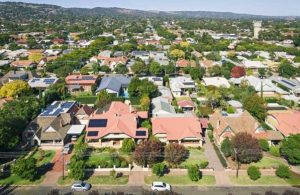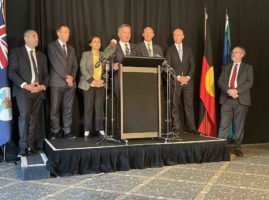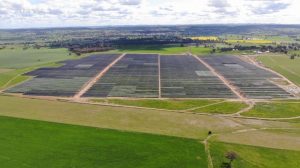The clean energy sector has issued a consensus call to the Energy Security Board to finally put an end to the contentious COGATI proposals on transmission costs, saying it will hurt new wind and solar investment without solving the challenges of new network investment.
The Energy Security Board has been developing a proposed set of energy market reforms, as part of a post-2025 re-design of the National Electricity Market. Many of the proposed reforms have been generally welcomed by the energy sector, including moves to establish two-sided energy markets.
Submissions responding to a consultation paper released by the Energy Security Board have been released publicly, with the overwhelming response from the clean energy sector being a call for the Energy Security Board to abandon consideration of contentious transmission investment reforms originally developed by the Australian Energy Market Commission (AEMC)
The AEMC pushed COGATI – which stands for co-ordination of generation and transmission investment – as a means to address emerging issues around a lack of transmission network capacity in parts of the electricity system where a large amount of new wind and solar projects are being clustered.
A lack of network capacity has seen a number of wind and solar projects delayed from connecting to the grid, as well as being directed to curtail output, out of concern for grid stability.
While there is a general consensus that reforms are needed to ensure new transmission infrastructure is built where it is needed, it also a widely held view that the COGATI proposal is not the right solution. NSW, for instance, has largely ignored it and gone ahead with its own plan to tender positions in its proposed renewable energy zones.
COGATI has two main components, locational marginal pricing and financial transmission rights, which are designed to shift some of the cost burden of new network transmission infrastructure onto new wind and solar developments.
But the proposal has been met by fierce opposition from the clean energy sector, who say it is an unfair burden on new projects. The sector succeeded in convincing the AEMC to have the Energy Security Board take responsibility for considering how to deal with the challenge of new transmission network investment as part of a Post-2025 energy market re-design.
The clean energy sector has now called on the ESB to abandon the proposals altogether. The Clean Energy Council described the COGATI proposals as the “wrong reform at the wrong time.”
“We maintain our concern that the transmission access reform proposal will add additional risk, complexity and cost to the market,” the CEC submission says.
ASX-listed wind farm developer Tilt Renewables said that it was concerned that the COGATI proposal remained on the table, despite the AEMC backing away from the reforms.
“There exists a significant lack of clarity on the need for the COGATI reform which is being proposed, and the stated goals of the reform have evolved over time and remain unclear,” Tilt Renewables said in its submission.
“The AEMC themselves no longer suggest this reform will actually help with transmission investment, and the response from generation investors has been overwhelmingly negative.”
“In the absence of any mechanisms supporting transmission investment and with no support from generation investors, it is not clear what this proposal will actually achieve in any positive sense for the market. What is clear is that the scope of the changes proposed would cause significant market disruption, inefficiencies and costs.”
This view was mirrored by established wind farm operator, Infigen Energy, which told the Energy Security Board that the current state of the COGATI proposals would hurt investment in new projects, and said that the development of Renewable Energy Zones would be a preferable approach.
“While the original intent of COGATI was to coordinate generation and transmission, the proposed framework does not achieve this. Instead, it is an overly complicated scheme that delivers no benefits to investors; rather, in our view it will harm investment at a critical time. As such, Infigen does not support the proposed COGATI reforms,” Infigen Energy said in its submission.
“Coordinating future generation and transmission can be assisted through clear, national frameworks for developing renewable energy zones, as well as leveraging the ISP to deliver transmission where needed.”
The clean energy sector has argued that the COGATI reforms would present a significant cost burden on new projects, and alternative approaches, like the alignment of new projects with new transmission infrastructure, as is being proposed as part of Renewable Energy Zones being developed by several Australian states is a more preferable approach.
The development of renewable energy zones would also be largely compatible with the implementation of AEMO’s Integrated System Plan, without leading to increases in investor uncertainty and investment costs that opponents argue would be created by the COGATI proposal.
The Clean Energy Investor Group which represents some of Australia’s largest investors in new wind and solar projects, said that the COGATI proposals have the potential to undermine the wider transition to a low carbon energy system
“[Clean Energy Investor Group] firmly believes that the AEMC’s COGATI Proposal is not required now as it does not address the current issues around lack of transmission capacity and congestion,” the Clean Energy Investor Group’s submission says.
“In fact, the introduction of COGATI would jeopardise the transition to a clean energy system by increasing the cost of capital, triggering negative flow-on impacts on the level of investment in clean energy and wholesale electricity prices ultimately paid by consumers.”
With a growing focus on the development of renewable energy zones, including commitments from the New South Wales and Queensland governments to oversee the coordination of transmission infrastructure with substantial new wind and solar investments, the COGATI proposal is likely to become increasingly redundant. Time will tell whether the Energy Security Board will dispose of the COGATI proposal altogether.
The Energy Security Board is expected to present its final set of energy market reforms to energy ministers in mid-2021.










